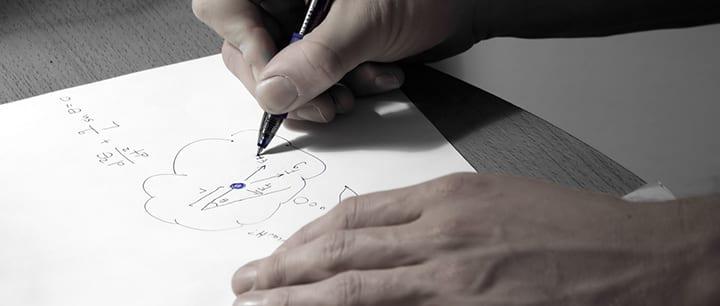 When you’re prepping for a math test, there are a few things that you can do to make sure you’re not sweating bullets when the test is handed out. Check out these math study tips so you can prepare properly and be ready to give the test your best shot!
When you’re prepping for a math test, there are a few things that you can do to make sure you’re not sweating bullets when the test is handed out. Check out these math study tips so you can prepare properly and be ready to give the test your best shot!
1. Use Diagrams
Get in the habit of using any given diagrams while studying, or creating your own if you need to. While this might seem like one of the more simple math study tips, it can be quite useful. Not all problems will need a diagram, but if you don’t give yourself a chance to draw one at all, then you’re shooting yourself in the foot.
2. Know Your Units
For any math problem with specific units of measurement, make sure you have their conversion factors memorized or handy in a reference sheet. For example, a problem could be given to you in feet, inches, and yards. If you haven’t paid attention to the relationship between all three of these units while studying, you’ll feel frazzled when you get to the problem and have to figure it out on the spot.
3. Get Familiar With Your Calculator
If you are using your own calculator for the test, and have used it on other homework problems and quizzes before, this is one of the few math study tips you can ignore. On the other hand, if you just got a new calculator, or know you’ll need to borrow your teacher’s calculator, make sure you know how to use it. That means figuring out where all the common function keys are, as well as how to access any trigonometric or high-level operations you may need.
Even if you’ve studied a ton the past few weeks, using an unfamiliar calculator will put you at a big disadvantage. Practicing with your new calculator on the types of problems you’ll be faced with before the test date is key.
4. Practice Reading Through Problems Completely
This is a common error to make when you’ve got a familiar-looking problem – many students will just glance at the problem, guess at where to start, and then begin solving without figuring out what exactly is being asked. Sometimes you’ll save a few seconds, maybe 10 or 20 at most. But more often than not, you’ll end up wasting a lot of time.
For instance, if you think you need to solve for speed but instead the problem is asking for distance, at best you’ve already found distance and need to backtrack through your solution. Worst case scenario you’ve spent a few minutes finding the speed but will need to start over completely to solve for distance. As far as math study tips go, this is one of the simplest tips to follow, but one of the hardest to remember when it’s crunch time! Just remember not to jump the gun when approaching a new problem, and you’ll do just fine.
5. Practice Showing Your Work
Even if you’ve got the solution to a few simple problems down pat, make sure to get into the habit of showing your work, even if you can solve it in your head. This is another trick that’s among the simplest of math study tips to actually follow, but it can take some practice to remember.
6. Don’t Cram!
Rather than trying to cram for the test the night before, space out your studying the week before the test. By studying over the course of several days, you can figure out which areas you are confident in, and which require more studying. You can also cut down on the time spent studying the night before the test, and get a good night’s sleep. Sleep is incredibly important before taking a test, as you’ll likely to perform worse if you’re tired. This is a helpful study tip for any subject, not just math!
7. Remain Confident in Yourself!
Above anything else, the best math tip is to stay confident! Remember that you were able to solve all of the problems when you were studying the few days before the test, so when you’re faced with a difficult problem, stay calm. Taking 15 seconds to breathe deep and relax before starting a hard problem can pay off. Getting flustered and spending a few minutes spinning your wheels will leave you further behind than if you took a few moments to relax before starting the problem.
Need some extra pointers? Working with a private math tutor is a great way to get the one-on-one guidance you need to perform your best in class and on important tests. Find a tutor in your area here, and start working toward the A+ you deserve!
Photo by CarbonNYC
Suzy S.

